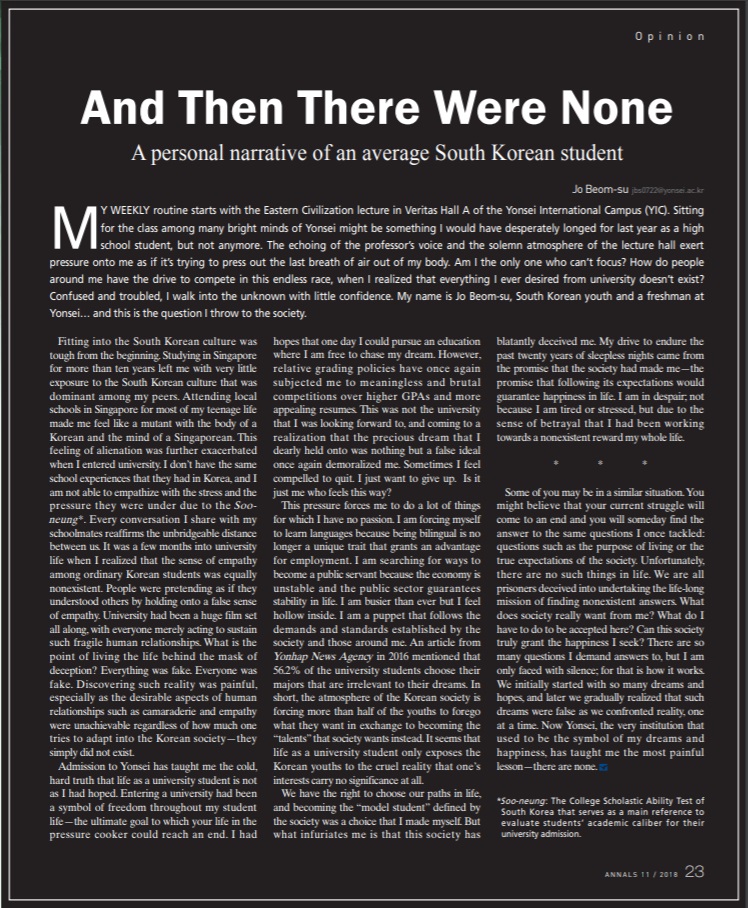MY WEEKLY routine starts with the Eastern Civilization lecture in Veritas Hall A of the Yonsei International Campus (YIC). Sitting for the class among many bright minds of Yonsei might be something I would have desperately longed for last year as a high school student, but not anymore. The echoing of the professor’s voice and the solemn atmosphere of the lecture hall exert pressure onto me as if it’s trying to press out the last breath of air out of my body. Am I the only one who can’t focus? How do people around me have the drive to compete in this endless race, when I realized that everything I ever desired from university doesn’t exist? Confused and troubled, I walk into the unknown with little confidence. My name is Jo Beom-su, South Korean youth and a freshman at Yonsei… and this is the question I throw to the society.
Fitting into the South Korean culture was tough from the beginning. Studying in Singapore for more than ten years left me with very little exposure to the South Korean culture that was dominant among my peers. Attending local schools in Singapore for most of my teenage life made me feel like a mutant with the body of a Korean and the mind of a Singaporean. This feeling of alienation was further exacerbated when I entered university. I don’t have the same school experiences that they had in Korea, and I am not able to empathize with the stress and the pressure they were under due to the Soo-neung*. Every conversation I share with my schoolmates reaffirms the unbridgeable distance between us. It was a few months into university life when I realized that the sense of empathy among ordinary Korean students was equally nonexistent. People were pretending as if they understood others by holding onto a false sense of empathy. University had been a huge film set all along, with everyone merely acting to sustain such fragile human relationships. What is the point of living the life behind the mask of deception? Everything was fake. Everyone was fake. Discovering such reality was painful, especially as the desirable aspects of human relationships such as camaraderie and empathy were unachievable regardless of how much one tries to adapt into the Korean society—they simply did not exist.
Admission to Yonsei has taught me the cold, hard truth that life as a university student is not as I had hoped. Entering a university had been a symbol of freedom throughout my student life—the ultimate goal to which your life in the pressure cooker could reach an end. I had hopes that one day I could pursue an education where I am free to chase my dream. However, relative grading policies have once again subjected me to meaningless and brutal competitions over higher GPAs and more appealing resumes. This was not the university that I was looking forward to, and coming to a realization that the precious dream that I dearly held onto was nothing but a false ideal once again demoralized me. Sometimes I feel compelled to quit. I just want to give up. Is it just me who feels this way?
This pressure forces me to do a lot of things for which I have no passion. I am forcing myself to learn languages because being bilingual is no longer a unique trait that grants an advantage for employment. I am searching for ways to become a public servant because the economy is unstable and the public sector guarantees stability in life. I am busier than ever but I feel hollow inside. I am a puppet that follows the demands and standards established by the society and those around me. An article from Yonhap News Agency in 2016 mentioned that 56.2% of the university students choose their majors that are irrelevant to their dreams. In short, the atmosphere of the Korean society is forcing more than half of the youths to forego what they want in exchange to becoming the “talents” that society wants instead. It seems that life as a university student only exposes the Korean youths to the cruel reality that one’s interests carry no significance at all.
We have the right to choose our paths in life, and becoming the “model student” defined by the society was a choice that I made myself. But what infuriates me is that this society has blatantly deceived me. My drive to endure the past twenty years of sleepless nights came from the promise that the society had made me—the promise that following its expectations would guarantee happiness in life. I am in despair; not because I am tired or stressed, but due to the sense of betrayal that I had been working towards a nonexistent reward my whole life.
* * *
Some of you may be in a similar situation. You might believe that your current struggle will come to an end and you will someday find the answer to the same questions I once tackled: questions such as the purpose of living or the true expectations of the society. Unfortunately, there are no such things in life. We are all prisoners deceived into undertaking the life-long mission of finding nonexistent answers. What does society really want from me? What do I have to do to be accepted here? Can this society truly grant the happiness I seek? There are so many questions I demand answers to, but I am only faced with silence; for that is how it works. We initially started with so many dreams and hopes, and later we gradually realized that such dreams were false as we confronted reality, one at a time. Now Yonsei, the very institution that used to be the symbol of my dreams and happiness, has taught me the most painful lesson—there are none.
Soo-neung*: The College Scholastic Ability Test of South Korea that serves as a main reference to evaluate students’ academic caliber for their university admission.


